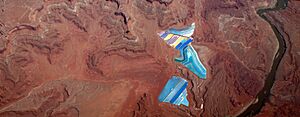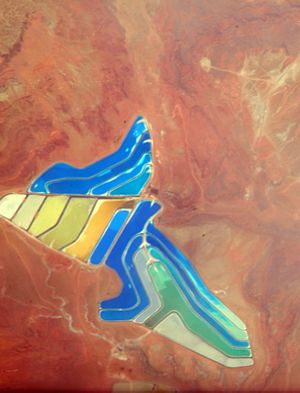Intrepid Potash facts for kids
| Traded as | NYSE: IPI Russell 2000 Component |
|---|

Intrepid Potash, Inc. (NYSE: IPI) is a company based in Denver, Colorado. They make fertilizer, which helps plants grow. This company is the biggest producer of a special kind of fertilizer called potassium chloride, also known as potash, in the United States. Intrepid Potash owns three mines, all located in the Western U.S.. These mines are found near the cities of Carlsbad, New Mexico; Moab, Utah; and Wendover, Utah.
Contents
Exploring Intrepid Potash Mines
Intrepid Potash operates three important mines in the western United States. Each mine has its own unique way of extracting potash, a key ingredient for healthy plants.
Carlsbad Potash Operations
The Carlsbad potash operations are located about 30 miles (48 km) east of Carlsbad, New Mexico. There are two main areas here: the East facility and the West facility.
The East facility produces two types of potash: sylvite and langbeinite. This facility can process the raw ore all the way to the final product, ready for storage or shipping. The West facility is currently not operating. It used to produce traditional potash, which was then sent by truck to the North facility for final processing and shipping.
Moab Potash Mine
The Moab potash mine, also known as the Kane Creek mine, is found along the right (northwest) bank of the Colorado River. It's about 20 miles (30 km) west of Moab, Utah. You can find it at the end of State Route 279 and near the Union Pacific Railroad. This area is even called Potash on U.S. Geological Survey (USGS) maps. It is also east of Dead Horse Point State Park and Canyonlands National Park. According to USGS reports, the Paradox Basin area has a huge amount of potash underground, possibly up to 2.0 billion tons (1.8 billion metric tonnes). The main mine in this area is the one at Kane Creek.
The plant was built by the Texas Gulf Sulphur Company and opened in 1963. It started as a traditional underground mine. Later that year, an accident trapped 25 miners. Seven of them were able to survive by building a barrier to keep fresh air in.
In 1970, the mining method changed. They started using a system that combines solution mining with solar evaporation. Here's how it works: river water is pumped into the mine to dissolve the potash. This creates a salty water mixture called brine. This brine solution is then pumped into large evaporation ponds. The sun and wind help the water evaporate, leaving the potash behind. Intrepid Potash bought this mine in 2000 from the Potash Corporation of Saskatchewan, which had bought Texas Gulf in 1995.
Wendover Potash Production
The Wendover potash mine is located about 120 miles (193 km) west of Salt Lake City, Utah. This site has been actively producing potash for over 65 years. Potash production from natural salty water (brines) at the Wendover facility began during World War I.
Between 1920 and 1936, several attempts were made to produce potash commercially, but they were not successful. However, by 1939, a successful commercial potash operation was finally achieved. This operation has been working continuously ever since, producing potash from the natural brines found in the area.
 | May Edward Chinn |
 | Rebecca Cole |
 | Alexa Canady |
 | Dorothy Lavinia Brown |


